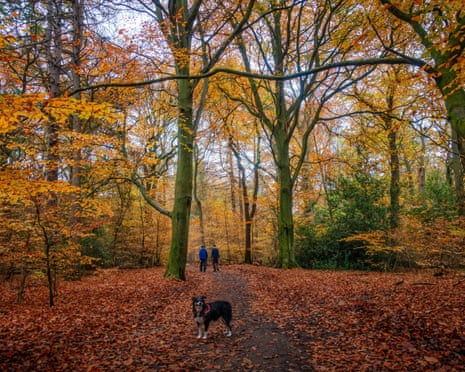
With ancient woodlands failing to regenerate, Alastair Collier recommends new forestry methods that could help build resilience. Meawhile, Martin Cooper wonders why his garden wants to become a forest
Your article paints a bleak picture of the challenges facing reforestation in the UK (In some UK woodlands, every young tree has died. What’s going wrong? 10 July). The failure of natural regeneration – driven by drought, heat, disease and deer grazing – is not just a crisis for ancient woodlands, it’s a stark warning for the future of all UK forestry.
This ecological breakdown reveals a fundamental flaw in our current approach: we are too focused on the number of saplings in the ground and not enough on their long-term resilience. Whether through natural regeneration or new planting schemes, tree survival must be the priority. With mortality rates increasing by 90%, as the article highlights, it’s clear that traditional methods are no longer fit for purpose in a changing climate.
To build forests that can withstand future conditions, we must invest in resilience from the outset. Research into techniques that improve sapling survivability is essential to protecting ancient woodlands and establishing new ones. Innovative approaches – such as vertical farming to produce climate-adapted saplings and biochar-enhanced substrates to improve soil health – are already showing promise. These methods can yield stronger, faster-growing trees with significantly higher survival rates.
Our ancient woodlands are among the UK’s most treasured natural assets. If we are to protect and restore them – while ensuring they continue to absorb carbon and support biodiversity – we need a new approach to UK forestry, one with resilience and survivability at its core.
Alastair Collier
Chief research and development officer, A Healthier Earth
At this dangerous moment for dissent
I hope you appreciated this article. Before you close this tab, I wanted to ask if you could support the Guardian at this crucial time for journalism in the US.
When the military is deployed to quell overwhelmingly peaceful protest, when elected officials of the opposing party are arrested or handcuffed, when student activists are jailed and deported, and when a wide range of civic institutions – non-profits, law firms, universities, news outlets, the arts, the civil service, scientists – are targeted and penalized by the federal government, it’s hard to avoid the conclusion that our core freedoms are disappearing before our eyes – and democracy itself is slipping away.
In any country on the cusp of authoritarianism, the role of the press as an engine of scrutiny, truth and accountability becomes increasingly critical. At the Guardian, we see it as our job not only to report on the suppression of dissenting voices, but to make sure those voices are heard.
Not every news organization sees its mission this way – indeed, some have been pressured by their corporate and billionaire owners to avoid antagonizing this government. I am thankful the Guardian is different.
Our only financial obligation is to fund independent journalism in perpetuity: we have no ultrarich owner, no shareholders, no corporate bosses with the power to overrule or influence our editorial decisions. Reader support is what guarantees our survival and safeguards our independence – and every cent we receive is reinvested in our work.
The Guardian’s global perspective helps contextualize and illuminate what we are experiencing in this country. That doesn’t mean we have a single viewpoint, but we do have a shared set of values. Humanity, curiosity and honesty guide us, and our work is rooted in solidarity with ordinary people and hope for our shared future.
It has never been more urgent, or more perilous, to pursue reporting in the US that holds power to account and counters the spread of misinformation – and at the Guardian we make our journalism free and accessible to all. Can you spare just 37 seconds now to support our work and protect the free press?
We value whatever you can spare, but a recurring contribution makes the most impact, enabling greater investment in our most crucial, fearless journalism. As our thanks to you, we can offer you some great benefits – including seeing far fewer fundraising messages like this. We’ve made it very quick to set up, so we hope you’ll consider it. Thank you.
Betsy Reed
Editor, Guardian US
Explore more on these topics